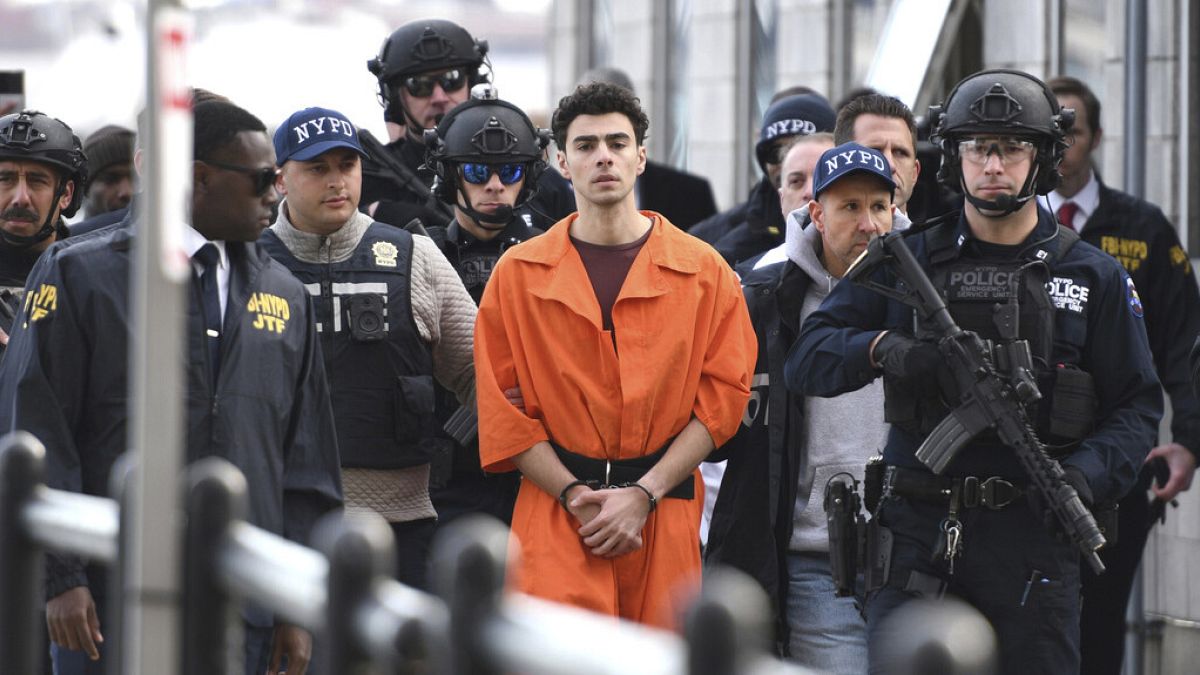Analysis: Hamas regenerates in Gaza despite Israeli defeat claims

Experts say Hamas is keen to keep bringing in new fighters despite losses, with new leader Yahya Sinwar pushing for continued armed conflict and no regrets over past attacks.
The Palestinian militant group Hamas, which carried out the attack on Israel on 7 October last year, is regenerating to continue the fight in the Gaza Strip, experts claim.
In addition to recruiting more fighters, the group which controls Gaza will continue to stake its claim over shaping the future of the territory.
“It is said, for example, that Hamas has lost 6,000 fighters, but it seems to be recruiting, or rather mobilising, around 6,000 members from its reserves,” Hugh Lovatt, a political analyst at the European Council for Foreign Relations (ECFR) think tank, told Euronews.
“They certainly won’t be as well trained as the initial group, but they’re still capable of holding a gun and firing rocket launchers at Israeli tanks,” the analyst added.
One year ago, Hamas militants killed 1,200 people and took 250 hostages in Israel a year ago, sparking a new war in the Gaza Strip.
The Chief of Staff of the Israel Defence Forces, Herzi Halevi, said in a letter sent to soldiers Monday on the occasion of the first anniversary of the attack that the Israeli army had “defeated the military wing of Hamas” and was continuing to fight in a bid to wreck its capabilities to instil terror.
However, analysts interviewed by Euronews explain that not only has Hamas not been defeated, but it still has the capacity to regenerate itself in terms of recruiting fighters and rehabilitating underground infrastructure.
“I think it’s very easy, in fact, to recruit and regenerate, simply because there are many orphans and groups like Hamas have always recruited those orphaned in previous Israeli attacks,” Joost Hiltermann, a political analyst at Crisis Group, told Euronews.
“I think we can safely say that Hamas has been working to restore some of the damaged tunnels,” Lovatt remarked.
New Hamas leadership is even more hardline
On the other hand, the assassination of Hamas’ political leader Ismail Haniyeh on 31 July, while he was visiting Iran, might have been seen as a major blow to the movement.
Exiled in Qatar, Haniyeh was seen as pragmatic and relatively moderate in negotiations. But the new leader, Yahya Sinwar, the mastermind of the 7 October attack, is understood to be a hardliner who will want to maintain the armed struggle at any price.
“Decisions are taken by consensus in the Shura Council. Of course, Sinwar would always have a strong voice because of what happened on 7 October and the way he is seen within Hamas, and perhaps outside Hamas, as a strong leader,” Hiltermann explained.
“And since he’s holding Israeli hostages, that gives him a strong card.”
Sinwar has no regrets about the 7 October attacks and believes that it is only possible to create a Palestinian state “by armed means”, according to a Reuters report citing six political sources: four in Palestinian organisations and two in Middle Eastern governments.
A former Lebanese communist militant, Nabih Awadah, who was imprisoned with Sinwar in Ashkelon between 1991 and 1995, told Reuters that the Hamas leader saw the 1993 Oslo Peace Accords between Israel and the Palestinian Authority as “disastrous” and a ploy by Israel, which would only give up Palestinian land “by force, not by negotiation”.
Categorising him as “obstinate and dogmatic”, Awadah said that Sinwar would light up with joy whenever he heard about attacks by Hamas or the Lebanese group Hezbollah against Israel. For Sinwar, military confrontation was the only way “to liberate Palestine” from Israeli occupation.
Diplomacy still unable to change the course of the conflict
The US and the EU classify Hamas as a terrorist group, but the movement remains crucial for negotiating a ceasefire, according to analysts.
Some Western countries could play a more important mediating role, said Hiltermann.
“Countries like Norway and Switzerland can hold talks with Hamas because they don’t give them the political label of a terrorist organisation. It’s a political decision,” he explained.
“The lack of direct negotiating channels is a problem because Hamas is obviously a movement that fights the military occupation with violence,” Hiltermann added. “But there needs to be more talk about solutions to the Israeli-Palestinian conflict, which so far are not being promoted.”
A political solution to the conflict will have the Palestinian Authority (PA) as its main interlocutor under President Mahmoud Abbas.
The PA governs the West Bank and part of Jerusalem and might be called upon to govern the Gaza Strip, replacing Hamas, which has ruled there since 2007 after winning elections with its political arm.
However, analysts say that Hamas will have to be included in any decisions about the future of the territory, even though Israel’s Defence Minister Yoav Gallant has promised to “wipe Hamas off the face of the Earth”.
“Let’s be clear, Hamas is not going anywhere, even though it has suffered so much,” Lovatt.
“It will always have the possibility of opposing any external intervention in Gaza, whether it’s an Israeli intervention, as is happening at the moment, or whether it’s the intervention of the Palestinian Authority in the future or an international force.”
Lovatt emphasised that the extension of the conflict to Lebanon and Iran’s direct retaliations against Israel aggravate the crisis and are also a clear sign that Iran will continue to support Hamas on all fronts.
“Iran continues to be a major source of funding, although not the only one, but certainly the largest source of funding for Hamas. For strategic reasons, for potentially ideological reasons, but also for very pragmatic reasons, Iran will continue to do so,” he explained.
“There doesn’t seem to be significant room for diplomatic solutions, which always exist. But the path chosen for now is to use force to subdue the enemies, see where the chips fall and work from there,” said Hiltermann.
The war in Gaza has killed more than 41,000 Palestinians and displaced almost two million, according to Gaza health authorities and UN figures.
World News || Latest News || U.S. News
Source link



